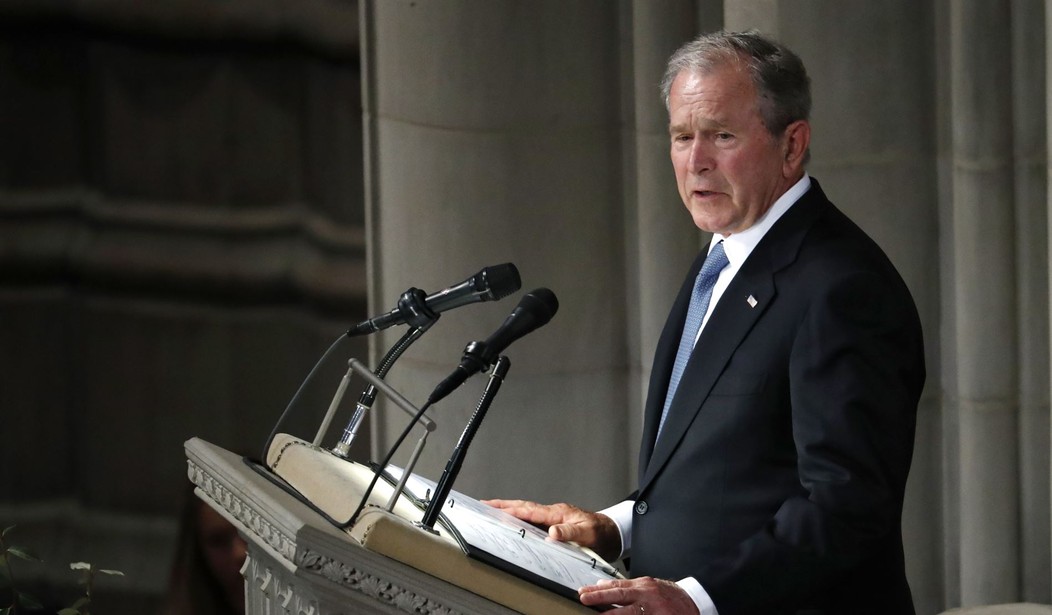Dick Cheney did it. Arnold Schwarzenegger did it. Adam Kinzinger did it, of course. So did Jeff Flake. Mike Pence walked right up to the edge but ultimately declined to take the plunge, but even George W. Bush’s daughter, Barbara Pierce Bush, and Dick Cheney’s notorious daughter Liz (that is, former Rep. Liz Cheney, R-Jan. 6) jumped right in. And now Liz Cheney is calling upon the biggest prize of all, former President George W. Bush, to join the party for the uniparty and endorse Kamala Harris for president.
Fox News reported late Friday night that Liz made her plea on The New Yorker Radio Hour, which was an appropriate forum for an establishment mouthpiece to issue a call to a former president to affirm his commitment to that establishment. After all, the New Yorker is a pillar of the political and media elite class that finds Donald Trump so intensely threatening.
Cheney expressed puzzlement over why Bush hadn’t already come out for Kamala. "I can't explain why George W. Bush hasn't spoken out,” she said, “but I think it’s time, and I wish that he would.” Fox notes, however, that “the former president and his wife, Laura, have said they have no plans to endorse a presidential candidate.” Yet even that was a semi-endorsement of Harris, as it was conspicuous in the extreme that the eighteenth Republican president in American history was refusing to endorse the nineteenth in the latter’s bid for reelection.
Remember also that Bush was steadfastly silent during the eight years of the Obama administration, fastidiously declining to criticize his successor. When Trump became president, however, suddenly Bush decided that it was just fine for a former president to criticize the man who currently occupied the Oval Office.
Whether or not Bush heeds Cheney’s call, the defections have not all been on one side. While a significant group of high-profile Republicans have endorsed Harris and the Democrats endorsing Trump are fewer in number, nothing can match the spectacle of a scion of Democrat royalty, a son of Robert F. Kennedy himself and the bearer of his very name, endorsing Donald Trump. Then there is Elon Musk, who just a few years ago called Trump a “dumb**s,” and a former candidate for the Democrat nomination for president, Tulsi Gabbard.
This is not just a matter of a few switches on both sides. We are in the midst of a political realignment unlike anything we have seen since the 1850s (which, incidentally, was the run-up to the Civil War). For roughly thirty years until that tumultuous decade, America had two major parties, the Democrats and the Whigs. Gradually, however, the slavery issue became so heated that the old political alignments were no longer relevant.
Both the Democrat and Whig parties had Northern and Southern wings, and thus pro-slavery and anti-slavery factions. As slavery inexorably became the defining issue of American politics, this became impossible to sustain. In 1854, a party devoted to the abolition of slavery, the Republican party, was founded; the Whig party disintegrated as anti-slavery Whigs joined the new party and pro-slavery Whigs joined the Democrats. Meanwhile, as even Northern Democrats embraced the idea of “popular sovereignty,” which held that any state or territory could have slavery if they voted for it, anti-slavery Democrats and Whigs joined the Republicans.
Ever since Donald Trump was first elected president in 2016 amid stiff internal opposition from the John McCain/Mitt Romney wing of the Republican party, Trump’s supporters have decried the “uniparty,” the Washington establishment of Democrats and country-club Republicans who support the status quo and don’t see any need to Make America Great Again. There didn’t (and doesn’t) seem to be what George Wallace once called “a dime’s worth of difference” between Paul Ryan and Mitch McConnell on the one hand and Chuck Schumer and Nancy Pelosi on the other.
Related: What Sort of Man Votes for Kamala Harris?
Meanwhile, the supporters of the freedom of speech, the right to bear arms, and the ability of Americans to live their lives without the all-powerful, all-pervasive interference of the Nanny State have been gravitating to Trump. This is as large a political realignment as the one America experienced in the 1850s; it may be even larger. Whatever names they might bear, the parties of the post-Trump era are shaping up to be one that stands for statism, socialism, and internationalism and another that upholds freedom, individual rights, and American sovereignty.
George W. Bush may decline Liz Cheney’s entreaties to endorse Kamala Harris; it would be refreshing, however, for him to reaffirm publicly his commitment to freedom, individual rights, and American sovereignty. Whether that is as important a priority to Bush as it should be, however, remains unclear.
https://pjmedia.com/robert-spencer/2024/11/02/liz-cheney-pleads-with-george-w-bush-to-take-the-uniparty-plunge-and-endorse-kamala-n4933880?utm_source=pjmedia&utm_medium=email&utm_campaign=nl_pm&bcid=45d996accbfd36c3837ab03d1775182de3af75990f114699abb5aa9734e3dc72&lctg=28264343



No comments:
Post a Comment